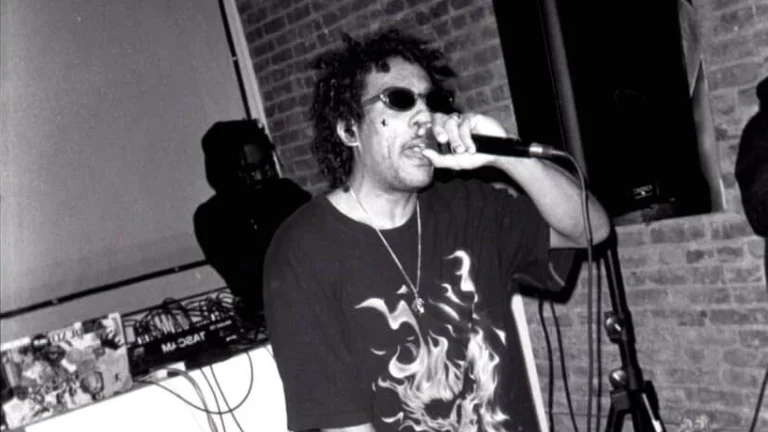Rapper, blogger, former hip-hop critic, and Edmonton’s Poet Laureate, Cadence Weapon—born Alberta Rollie Pemberton—isn’t the first to talk about the downsides of the information superhighway. However, he may be the most effective in speaking about it from the point of view of someone who has to rely on it to eat and stay relevant. The hell of an artist who just wants to get paid to be an artist is fighting against a wave of apathy and absentmindedness. If you aren’t where the table is, you don’t exist. If you are, you only have so long to be there before you are thrown into the toy box for the next fresh thing on the market. From most people’s vantage point, a computer is a tool of education and work. Still, it can also be a place where your face, your identity, your personality, and even your ability to focus are stolen in a matter of time. On the reflective, energetic, and even slightly melancholic Rollercoaster, Cadence Weapon does many things at once: he speaks computer language, acknowledges the shortening of mental bandwidths, and discusses the hip-hop culture he is a part of.
Speaking of the latter, most recently, the rap culture has been invaded by those who understand the struggle too well that what sells and gets attention, albeit for a short time, are glitz, glamour, and emptiness. This is not within Pemberton’s wheelhouse. As a rapper, Cadence Weapon approaches music with the same critical eye as his hip-hop coverage. On previous albums, he has critiqued biters (“Sharks”), the selling out of hip hop culture (“Real Estate”), and even the deterioration of modern cities due to gentrification (“Conditioning”). Therefore, it was only a matter of time before Pemberton used his expertise to tackle the state-of-the-art’s chokehold on the world and music in general.
Cadence Weapon revealed his main musical inspiration for this album was hyper pop, which isn’t far from what he tackles. Hyper pop by nature is glossy, noisy, fast-paced, surrealist, confounding, escapist. Hyper pop is—like vaporwave was—the sound of the online zeitgeist. Throughout Rollercoaster, he works with the energy of his most frantic and chaotic production by subtly turning the chaos into emotional intensity in his rap delivery. For example, “Press Eject”—a bass-heavy track that sounds like hip-hop/trap takes production cues from SOPHIE’s heaviest, noisiest tracks—finds Cadence Weapon seething he doesn’t want to “play their game” because doing so has caused him to get lost in the hypnosis of the likes and retweets. Singer-songwriter Bartees Strange—a frequent collaborator on this album with three songs he produced and two of which he is a lone feature—helps to emphasize the struggle on acoustic opener “Cadence £∞™.Mp3,” where they both share the sentiment of road running and barely making it. “Look at my feed if you miss our connection / Infinity extorted for an audience,” Cox laments before dropping the big bomb: “I can’t pay rent on earth or online again.”
The frustration of never making rent is further doubled down with songs such as “EFT” and “Bots.” On “EFT,” which rails against nepo babies and fake indie artists, Cadence Weapon proudly and bravely tackles the supposed “gauche” nature of wanting to get paid for their work. Specifically, the anxiety of being proud of trying to make money off of your work and dodging evil stares of bands and artists who look at him with disdain for such thing. “If I talk about wealth, would they say I’m arrogant?” he asks. “Would I win the Polaris? Would they go and stop caring?” This is before he rolls his eyes saying, “Some of these bands? They’re millionaires / They just don’t share it.”
Meanwhile on “Bots,” a track that denounces industry plants and farm streaming, Cadence Weapon recognizes that using anonymous artists and farm streaming makes it hard for him to get any respect as an artist. “I couldn’t get to my flowers / Tried for hours with no luck,” he says. “So I came out the house with the big chainsaw and chopped that plant to a stump.” To further support his ire, you can check Spotify for proof. 4batz, an artist recently accused of being an industry plant, currently has 14.3 million monthly listeners. Cadence Weapon, who has been making music since 2005, only has 41,000.
But regardless of whether he wants to play, Cadence Weapon doesn’t mind doing so in the little ways he can. The techno-infused “Exceptional” is his version of flex rap, but embracing the absurdity of it all. “You can sign a book deal with my Notes app,” he smirks. “My Computer” also plays into the non-sequitur approach taken often in hip-hop, but with an electroclash/tech-funk background to the music. But at the end of the day, his attempts to play the game his way or not play at all make little difference if it doesn’t keep him in the limelight, wherever it can be shown.
His closing track “TL;DR”—which features Harrison—embraces, often to a devastating degree, how he can talk about his real life and declare his sobriety, but in the age of the internet, there is no promise that anyone but those who got that far into the album will care. “I ain’t reading all that,” Cadence Weapon says, mocking those with short attention spans. “TL;DR” is a heartwarming look into his life off the internet and a heartbreaking acknowledgment of one’s apathy, courtesy of living on the internet.
No word on whether Rollercoaster will earn him the flowers he asks for, but there is no denying that what Cadence Weapon created is a modern-day masterpiece. An album about trying to get by as a musician, producer, and writer at a time where on the one place it should be easy peasy to make it on, there are roadblocks at every turn to getting there. It’s an album that if it isn’t one of the best, should be counted as one of the most relatable.





